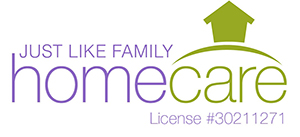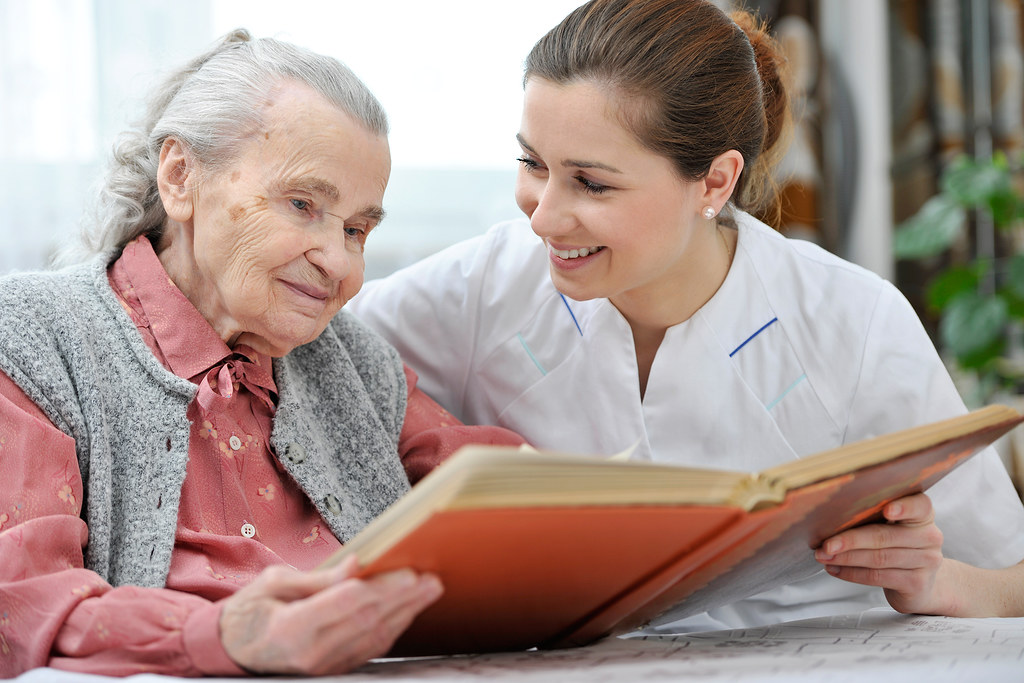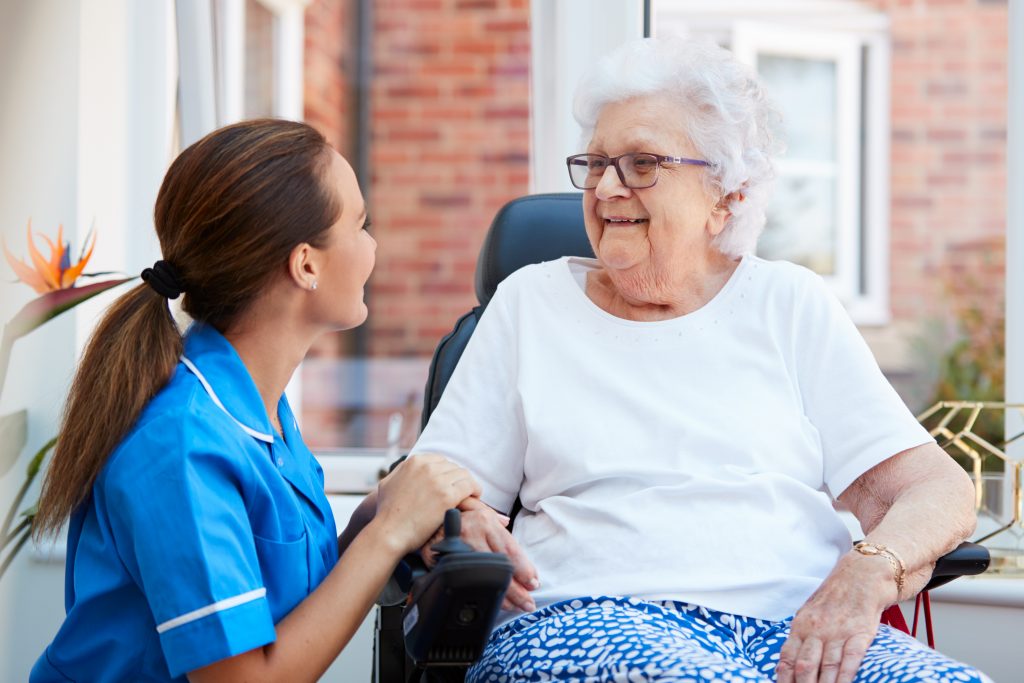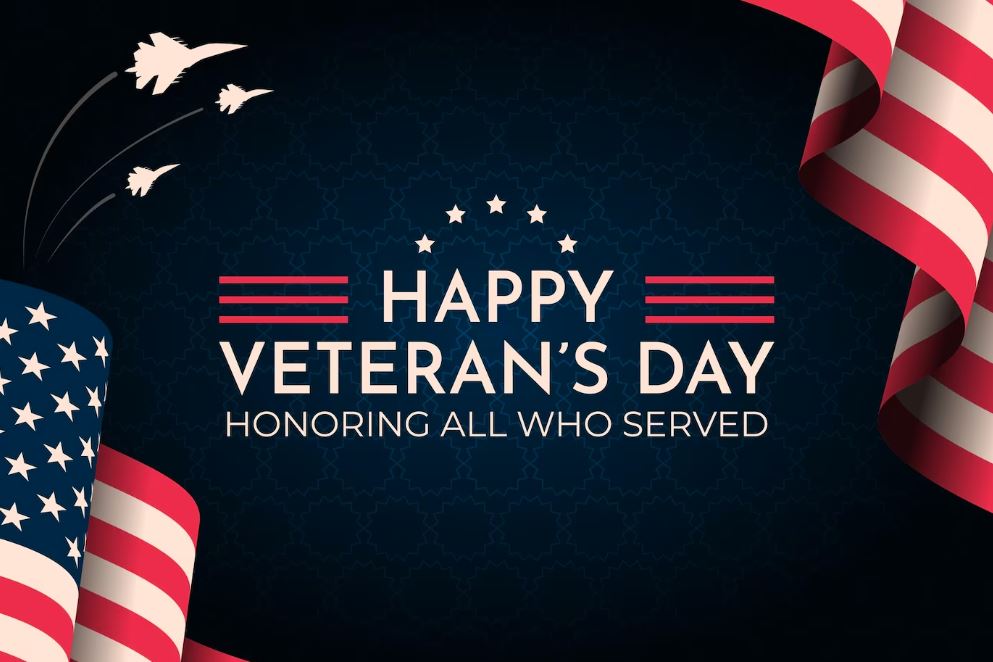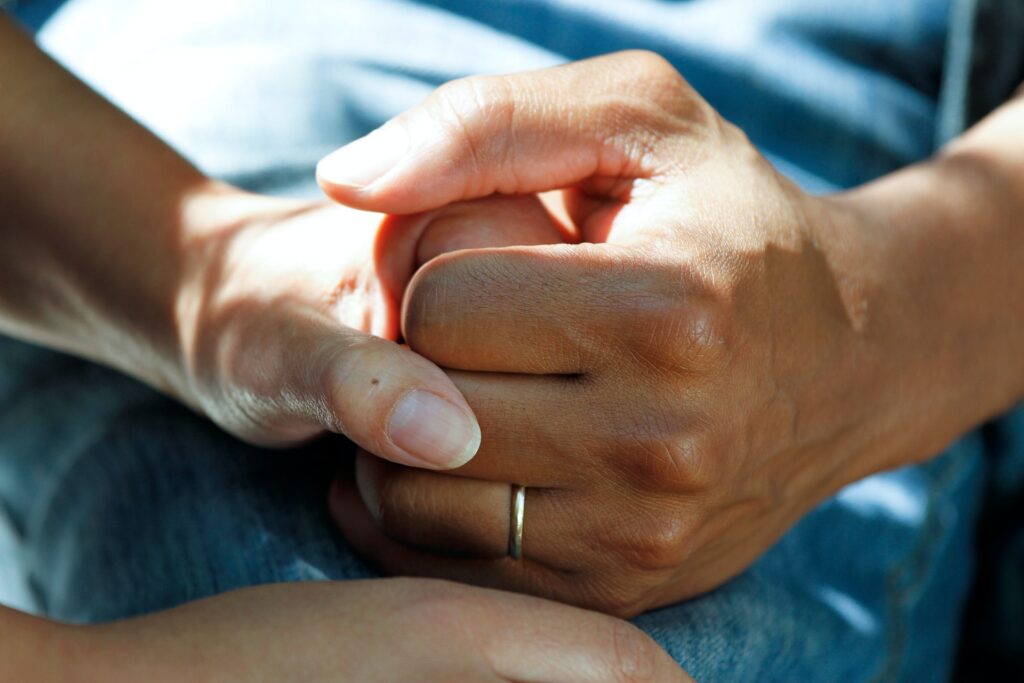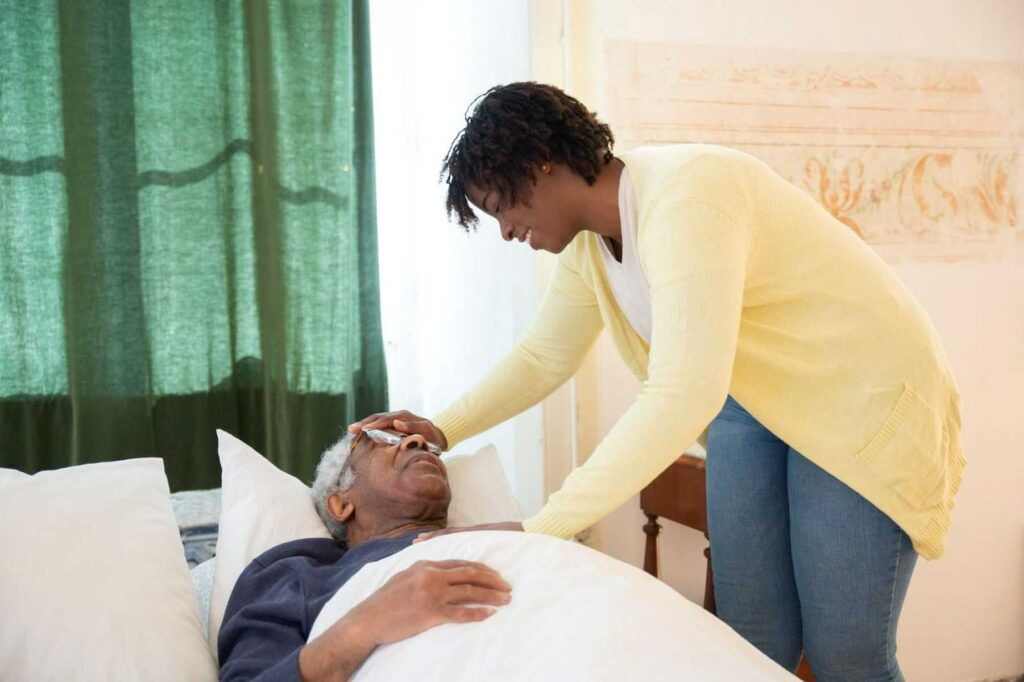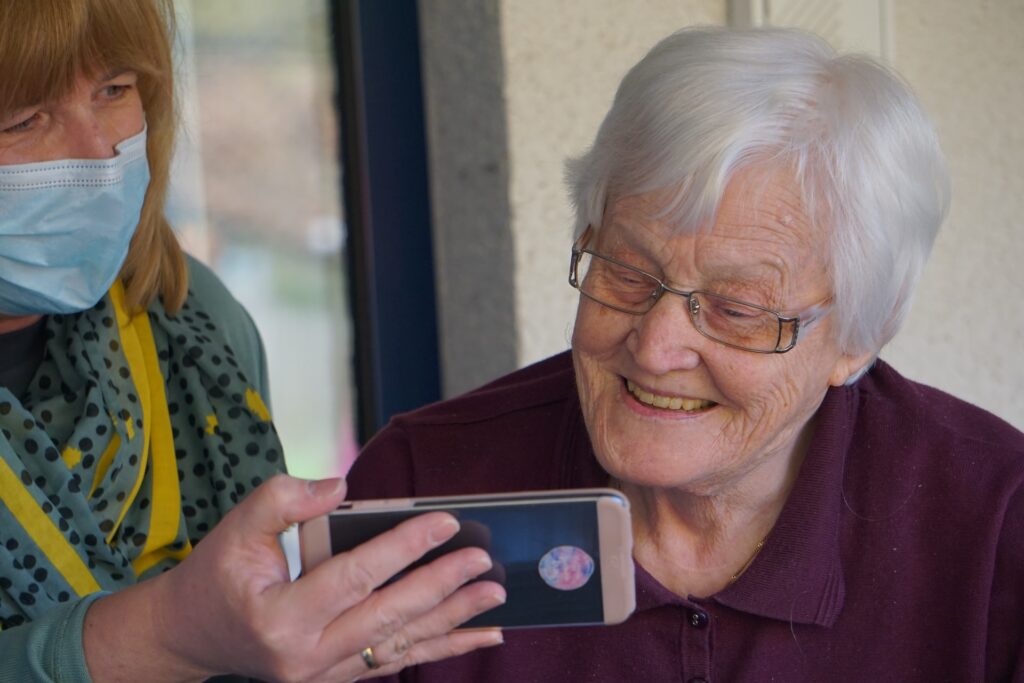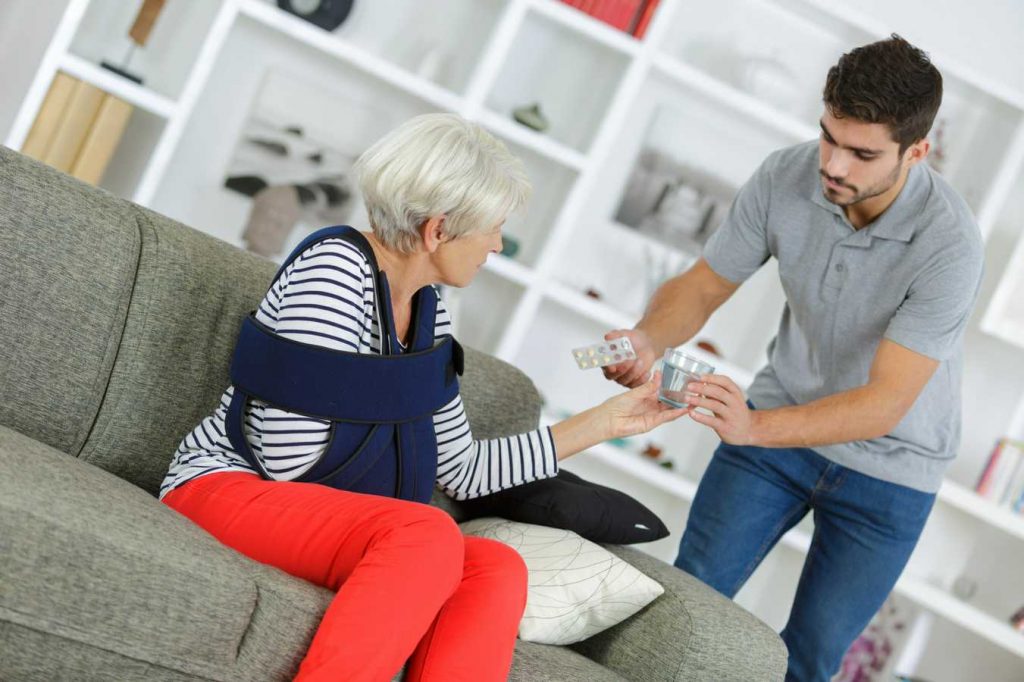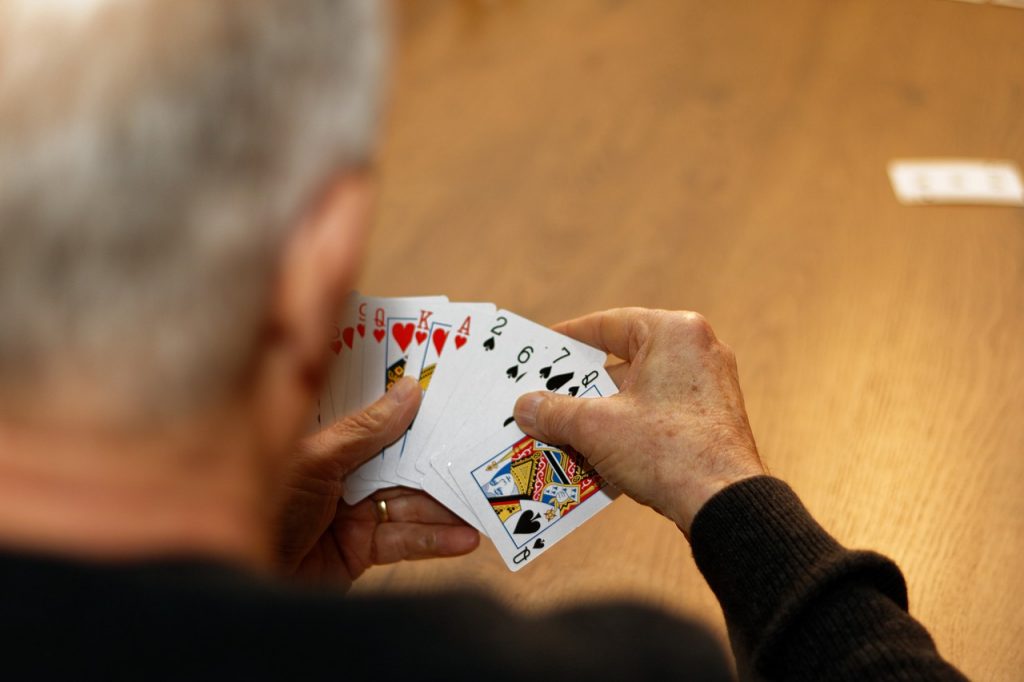Planning for Care
Aging in Place
February 27, 2024
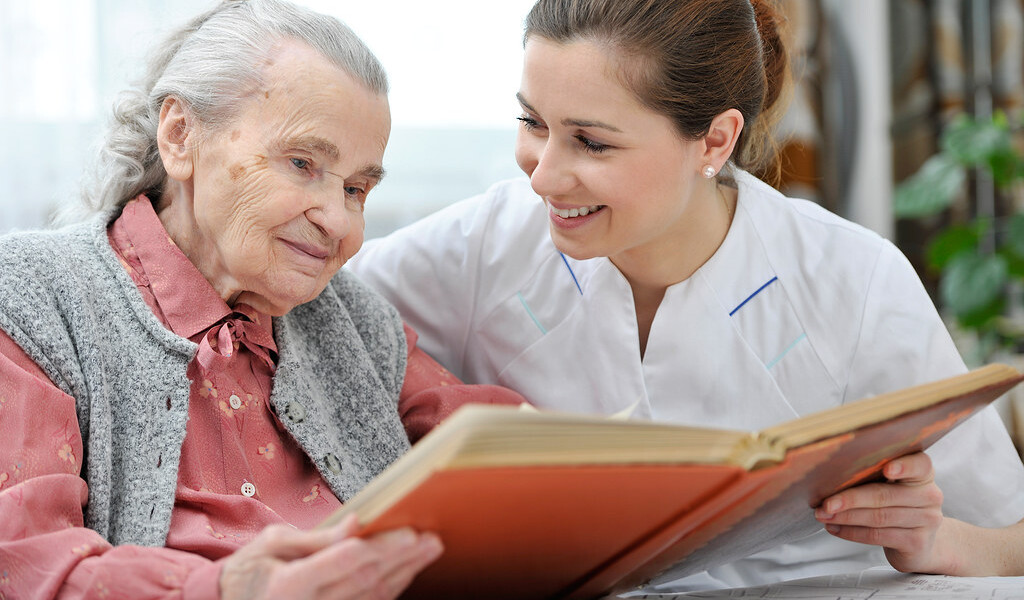
Aging in place is the idea of growing older while remaining in one’s own home, rather than moving to a senior care facility. This choice is favored by many senior citizens since it preserves their comfort, familiarity, and independence. However, aging in place may also require some assistance. Just Like Family Home Care can provide various services to help seniors live safely and comfortably at home. A few of the main advantages of using Just Like Family Home Care to age in place include:
• Personalized care: Just Like Family Home Care is able to customize services, including the kind, frequency, and length of care, to meet the unique needs and preferences of elders. You can choose the caregivers you trust and feel comfortable with, and communicate with them directly about your expectations and feedback.
• Cost-effectiveness: Just Like Family Home Care can often provide care at a lower cost than institutionalized care, especially for long-term or chronic conditions.
• Improved health outcomes: Just Like Family Home Care can offer a range of health care services, such as medication management, wound care, care after surgery, monitoring of vital signs, injections, attending doctor appointments, and many more. By using these services, seniors can enhance their quality of life, avoid or treat health issues, and spend less time in hospitals or emergency rooms.
• Emotional well-being: Just Like Family Home Care can also support seniors’ emotional well-being by providing companionship, social interaction, and mental stimulation. We can help elderly cope with loneliness, depression, or anxiety, and enhance their self-esteem and dignity.
At Just Like Family Home Care we empower seniors to maintain their independence, improve their quality of life, and grow old comfortably in their own homes.
Incontinence in Seniors
January 29, 2024
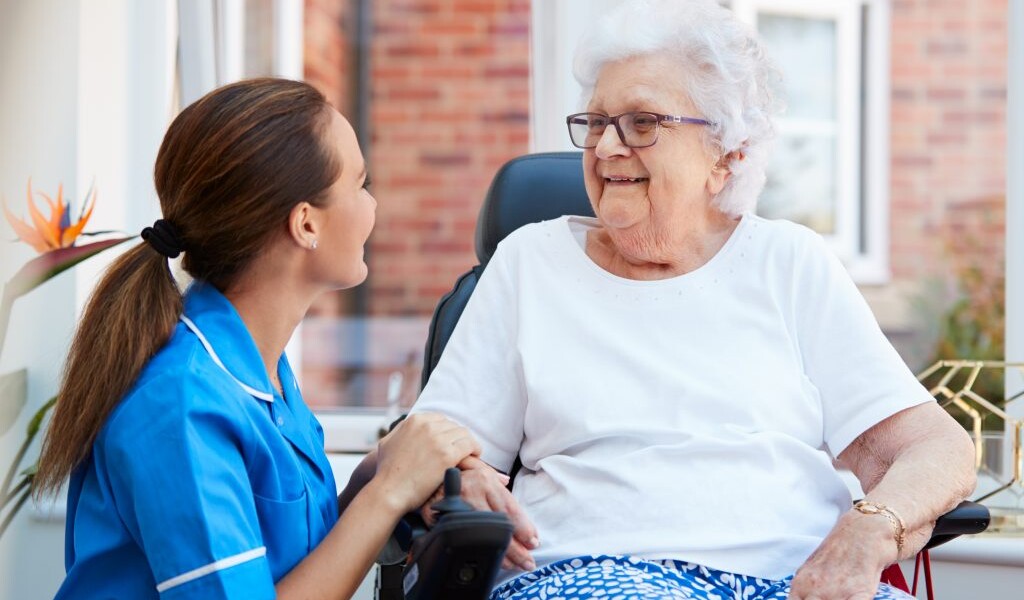
Incontinence is a common problem among seniors. About 75% of women over age 65 suffer with urine leakage, and 60-70% of people with Alzheimer’s eventually become incontinent. Incontinence can be caused by aging, illness, or injury. Weak muscles of the sphincters and pelvis can lead to urinary incontinence because the muscles cannot remain tight enough to hold urine in the bladder, or the bladder does not have enough support from the pelvic muscles to stay in its proper position. Weak bladder muscles may also result in not being able to empty the bladder completely. Additionally, incontinence may be caused by medication interactions, vaginal or urinary tract infections, prostate problems and progressive diseases that lead to cognitive and physical decline.
Just Like Family Home Care can help seniors deal with incontinence by providing assistance with toileting, hygiene, incontinence products, and medication management. We can also provide transportation to doctor’s appointments and prescription pickups. Just Like Family Home Care can also offer emotional support and companionship to seniors who may feel embarrassed or ashamed about their incontinence. We can also help seniors stay connected with their friends and family by providing transportation assistance to social events and activities.
At Just Like Family Home Care we provide seniors, who are incontinent, with support they need to keep their dignity and self-confidence to continue being involved in life.
Happy Veterans Day
November 10, 2023
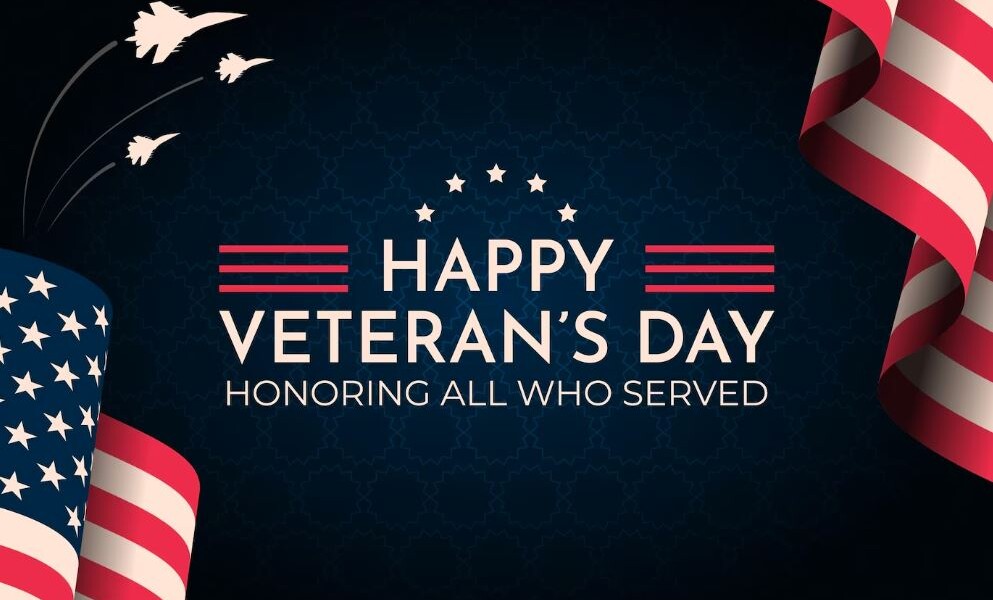
Veterans Day is a special day to celebrate and appreciate the brave men and women who have served our country in the military. At Just Like Family Home Care, we are proud and honored to provide home health care services to veterans and their families. We believe that veterans deserve the best quality of care and respect for their service and sacrifice. That is why we offer a range of services and benefits that are tailored to meet the unique needs and preferences of veterans.
Some of the services and benefits that we offer to veterans include:
• A consultation and assessment to determine the level and type of care that is suitable for each veteran.
• A customized care plan that is designed to address the specific goals and challenges of each veteran, such as managing chronic conditions, recovering from injuries, coping with mental health issues, or enhancing independence and quality of life.
• A team of skilled and compassionate caregivers who are trained and experienced in working with veterans and their families. Our caregivers are carefully matched with each veteran based on their personality, interests, and background. Our caregivers also undergo regular evaluation to ensure that they deliver the highest standards of care and professionalism.
• A 24/7 support and communication system that keeps veterans and their family caregivers informed and involved in the care process. We provide regular updates and feedback on the progress and well-being of each veteran. We also welcome and encourage any questions, comments, or suggestions from veterans and their family caregivers. We are always available and ready to respond to any concerns or emergencies that may arise.
At Just Like Family Home Care, we are more than just a home health care provider. We are a partner and a friend to veterans and their families. We are committed to honoring and supporting veterans not only on Veterans Day, but every day of the year. We are grateful for the opportunity to serve those who have served us. Happy Veterans Day!
Hurricane Preparation Tips for Seniors
September 26, 2022

Hurricane Ian is a reminder that emergencies and disasters can strike quickly and without warning. Forcing us to evacuate our neighborhood or staying home for several days. Are you prepared in the event of flooding or power outage? Learn how to protect yourself and cope with disaster by planning ahead. Local officials and relief workers may not be able to reach everyone right away. You can deal with disaster better by preparing in advance and by working with those in your support network: your family, neighbors, friends, or at-home caretaker.
When a hurricane threatens, seniors are especially vulnerable. It’s important for anyone living in Southwest Florida to consider hurricane preparedness, but seniors face extra challenges. Isolation, limited mobility, and medical needs. Older adults can eliminate many of the post-hurricane hardships by taking a few simple steps.
Get a Hurricane Emergency Kit
Disasters can strike at any time. Planning ahead can avoid waiting in long lines for crucial supplies, such as food, water, and medicine, and you will also have essential items in case of evacuation.
For your safety and comfort, have a disaster supply kit packed and ready in one place before a hurricane hits. Make sure to include water, perishable food, a flashlight, medications, sanitation and personal hygiene items, documents, whistle, and one change of clothing. Consider a battery-powered fan to avoid heat exhaustion. Assemble enough supplies to last for at least three days and store your emergency kit in an easy-to-carry backpack or duffel bag.
Discuss a plan with family, community, and friends
Explain your concerns to your family and others in your support network and work with them as a team to prepare. It’s best to not stay by yourself, but if you must, arrange for someone to check on you at the time of a disaster. Be sure to include any caregivers in your meeting and planning efforts. Assess yourself and your household. What personal abilities and limitations may affect your response to a disaster? Think about how you can resolve these or other questions and discuss them with your family and friends.
Keep physical copies of personal and emergency information
Nowadays we rely on our cell phones for vital formation like emergency phone numbers and contacts. A power outage means we won’t be able to charge our phones, limiting our access to this information. Write down emergency contacts and phone numbers. Include the numbers of those in your support network, like a caretaker or nurse. Remember that in some emergencies telephone lines might not be working, so consider having alternative plans for contacting those in your network. Keep copies of vital family records and other important documents. These include birth and marriage certificates, social security cards, passports, wills, deeds, and financial, insurance and immunizations records in a safe, water resistant location, or a safe-deposit box.
When the Storm Strikes
Stay where you are and make yourself as safe as possible until the storm passes, unless you are told to evacuate. In some emergencies such as a severe flooding you will need to know how to seal your home for safety. Shutters and sandbags can be used to stop water from getting inside. The National Weather Service typically issues hurricane advisories within 24-36 hours of a tropical storm threat. Stay in your home and listen to your television or radio for emergency messages or updates on any new weather patterns. Be prepared to evacuate or be on your own and have additional food and water for three to seven days.
Public Shelters
Southwest Florida has multiple public shelters available during hurricanes. Public schools, churches and relief organizations, like the American Red Cross, may open shelters if a disaster affects a large number of people or the emergency is expected to last several days.
Be prepared to go to a shelter if
- Your residence is close to body of water
- Your residence is in a flooding zone
- You depend on uninterrupted power
- Police or other local officials tell you to evacuate
Home Caregivers—Special Considerations
If you’re a caregiver for a senior loved one, particularly one who lives alone, supporting them with hurricane preparedness is undoubtedly a priority. Prepare a disaster supply kit for any family member who cannot do so on their own. If your loved one receives home care, speak with the caretaker or nurse to see what their role would be in case of an emergency at home or if evacuation is indicated. Develop a at-home emergency plan and an evacuation plan.
Plan for those with Disabilities
Your oxygen provider can help you obtain a backup cylinder, a portable tank, and necessary supplies in the event of an evacuation if you use oxygen. Keep support items like wheelchairs and walkers in a designated place so they can be found quickly. This step is essential for those who have home-health caregivers, particularly for those who are bed bound. Find out where the closest shelter is located and transport available in case an evacuation is needed, especially if your family member requires an uninterrupted power source for survival.
When a hurricane does strike, it’s important to know that you and your loved one are safe and adequately prepared. Need help assembling a hurricane disaster kit, or practicing your emergency/evacuation plan? Just like Family Home Care is here to help.
For additional information, visit Florida Hurricane Preparedness Resources to help you make an emergency plan and be prepared!
How to Make the Transition from Hospital to Home Successful
August 30, 2022
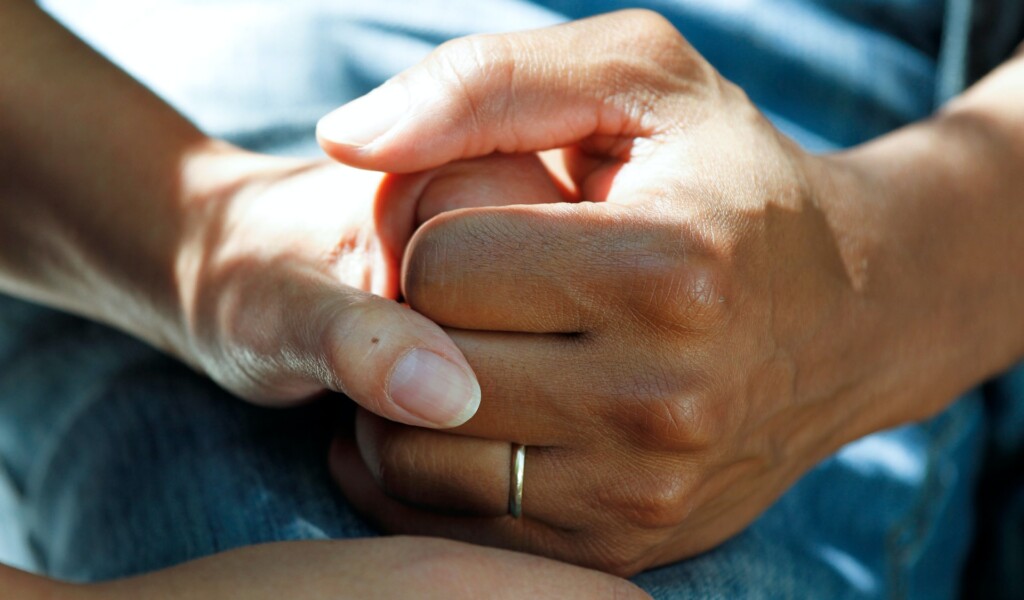
Most hospital patients aren’t fully recovered when they leave — especially after surgery or a complex procedure. Although having them back at home is comforting and relieving, the transition period can be overwhelming. Your loved one’s recovery from hospital discharge to home is crucial, but they will need to adjust to certain factors such as environment, people, and routine.
As a result, you and your family need to understand and prepare ahead of time. Here are some tips that will help you or your loved have a successful post-surgery recovery.
Make sure you understand the hospital discharge process
As the expert on your loved one, you play a crucial role in their post-surgery care. Make sure to be prepared and do some research beforehand, finding this article means you are on the right track! Understanding why your loved one was hospitalized can also help you understand what symptoms to look out for once you are home, along with what to expect in the future. When your loved one is given his or her discharge paperwork, review the summary and make sure you don’t have additional questions. Be sure to meet with the discharge planners during the discharge process. Discharge planners are dedicated professionals who help hospitals plan for a safe discharge.
Understand the medication, symptoms and side effects
Having a clear understanding of how long it will take for symptoms to improve, what types of setbacks are typical, and when you should reengage medical attention is crucial. To be able to take good care of yourself or your loved one–properly and accurately, you need to be aware and understand every single detail in regards to their medication. This can be considered the most important factor to keep in mind when you get to bring your loved one back home.
Ensure your loved one’s space is well prepared and comfortable before they arrive
Hospitals are known to be clean, well-sanitized, and comfortable. It will be much easier for you or your loved one to adjust if the surroundings are similar. Before your loved one heads home, make any necessary changes, so you will feel more prepared and the house will seem calmer. A clean and comfortable environment will help your loved one recover physically and emotionally.
Be ready to provide extra care or need extra care
When someone has been hospitalized, you can always assume that they will need extra assistance and supervision following their discharge. Even in the best-case scenario, older adults usually require time and patience to return to their routine. If you are welcoming a family member to your home, make sure that anyone else living with you is ready for new adjustments and willing to help out.
If your loved one usually lives alone, plan on having someone stay with him or her for at least the first week. If you need help finding someone, contact us today to find a post-hospital caregiver that fits you or your loved one.
Look for a post-operative caregiver if you are not sure you can do it alone
In order to take proper care of your loved one, you must consider looking for a reliable caregiver. This will help you make things easier and more comfortable for your loved one. Some doctors recommend families to look for professional caregivers especially when the family has no medical background. Just Like Family Home Care has nurses available to offer superior care directly in your home or temporary accommodation setting. Our flexible hours are designed to meet the needs of our clients following surgery, as we understand how difficult it may be to anticipate how much care you may require. To learn more about daily care, extended hours, and post-operative care, click here.
Make sure to arrange a follow-up check up with a primary-care doctor
To make sure the transition and recovery process is going well and smoothly, it is recommended to set an appointment with a doctor after a couple weeks of staying at home. In this case, you will be aware if you or your loved one is in need of treatment or extra medication or if they are doing pretty well.
Taking home a former hospital patient might be challenging at first. Surgery is a major decision that requires a lot of research and planning. Post-operative care is just as important. Just Like Family is tailored to those who are seeking the best in nursing care and know the peace of mind that comes with having assistance following surgery.
What is Late Stage and End-of-Life Care
June 24, 2022
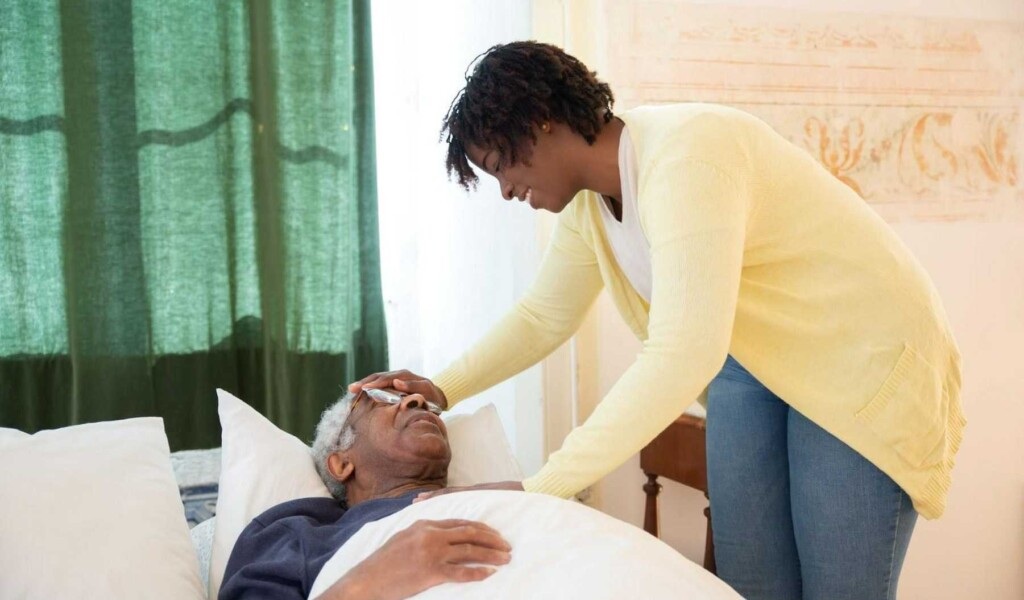
The final stage of life is challenging, even for caregivers with lots of experience. If your loved one is in their final days of life, the only gift you can give them is the best care to improve their comfort and quality of life.
End-of-life care involves acts of daily care and lots of physical, mental and emotional support to your loved one during their last days on earth. The primary goal is to make them more comfortable, at least for the remaining days, months or years. Here’s all you need to know about end-of-life care.
When does someone need late-stage and end-of-life care?
No one knows exactly when they’ll need end-of-life care. It all depends on the individual and the progressions of the disease. However, anyone with a life-threatening or life-limiting illness is eligible for end-of-life care.
Also, older adults in their golden days can benefit from late-stage care. Terminal care may last a few days, months, or even years, depending on the individual.
End-of-life signs
Facing your loved one’s final moments in life can be scary – especially if it’s your first time. However, knowing what to expect can help you feel less anxious and better prepared. This allows you to make your loved one’s final days less painful and more comfortable.
While everyone has a unique end-of-life experience, some changes and signs cut across.
Here are some common end-of-life signs;
- Loss of appetite
Energy needs decline as the body shuts down. Hence, your loved one won’t be taking certain foods, especially those that are hard to chew and digest. Unfortunately, this can be upsetting for you as a caregiver because a considerable part of caregiving involves feeding your loved one.
- Shortness of breath/labored breathing
Breathing difficulties or shortness of breath are common symptoms of end of life. Some people might experience air hunger – a petrified inclination to breathe better. Additionally, people may experience Cheyne-strokes breathing – loud breathing with a peculiar rattle. This usually stems from an unstable ventilatory control as the brain or heart fails.
- Physical weakness
Since your loved one takes less food, they’ll lack the energy to do every day, physical activities like putting clothes on, walking long distances, or even lifting things. Sometimes, even speaking becomes a challenge. As a result, you may need to help your loved one find an every day routine that works for them.
- Pain
End-of-life pain is common in most people, although some become accustomed to it. However, the type and amount of pain will vary depending on the individual and their health condition. For instance, if they have cancer, they are more likely to experience pain during their final days.
End-of-life care considerations
Working closely with your hospice agency and your loved one’s physician, caregivers can provide the care and support the family needs during this difficult transition. When a loved one is in their last days of life, it’s imperative to treat them with respect, follow their late-stage wishes, and ensure they are comfortable.
The type and amount of care vary depending on the individual health and progression of the disease. Ideally, these people need care in four areas:
Physical comfort in end-of-life care
Comfort care is an essential part of medical care at the end of life. It is care that helps or soothes a person who is experiencing physical discomfort stemming from various sources.
Make sure they are seated or laying down in a comfortable space. If they experience breathing problems, open a window or use a fan or humidifier to circulate air in the room. Additionally, it would help if you raise the head of the bed to ease breathing.
Furthermore, offer favorite foods in small amounts to prevent digestive or loss of appetite problems.
Managing mental and emotional needs during end-of-life
Most people in their late stages of life experience mental and emotional distress. Some have specific concerns and fears that could lead to depression or anxiousness.
Therefore, as a caregiver, you should provide support to help manage emotional and mental distress.
Some tips for managing emotional and mental distress include;
- Set a relaxing mood – find out the things that raise your loved one’s mood. For instance, if they don’t want visitors, ensure no one enters their room.
- Physical contact – sometimes you’ll feel scared holding your loved one during their late stages. However, you should establish a physical connection with them, perhaps holding hands or massaging.
- Be present – the greatest gift to a dying person is your presence. So make sure you’re always available to talk or listen to what they say.
- Play some music – music at low tones can lessen pain while allowing the patient to relax. Therefore, suggest playing music and find out which music they prefer.
- Involve them – In most cases, you’ll make most of the decisions and choices on behalf of your loved one. However, if they can still communicate, try to involve them in most matters. For instance, you might ask which food they want, which clothes to wear, how to make them more comfortable.
Alternatively, you might consider a counselor familiar with end-of-life issues.
Support for practical tasks
Someone nearing end-of-life can’t perform everyday tasks like bathing, walking, eating, and changing clothes. And since some of the activities are essential, you want to ensure they get enough support for practical tasks.
Benefits of hiring an end-of-life caregiver
End-of-life care focuses on improving the quality of life of your loved one during their final stage in life. But sometimes, you might need some help to provide the best care for your loved one. This is where a caregiver comes in. There are various benefits of hiring an end-of-life caregiver.
First, end-of-life caregivers have lots of experience caring for people in their final days. They have been trained to provide adequate care regardless of individual conditions. They know what to do, when to do it and how to do it perfectly.
Additionally, end-of-life caregivers provide support to family members and carers during late-stage and even after death. They will be there with you to provide physical and emotional support to you and your loved ones.
End-of-life services
We understand the end-of-life stage is an emotional time for you, friends and other family members. That’s why you should work with your loved one’s physician and caregivers to get the best care and support during this challenging transition.
Some of our end-of-life care services include;
- Bed baths
- Personal hygiene assistance
- Compassionate support
- Feeding assistance
- Nurse-deligated meds administration
- Assist with comfort measures
Final thoughts
It’s hard and painful to watch a loved one during their final days on earth. However, knowing what to expect and how to provide late-stage care can make a difference. End of life focuses on minimizing pain and improving comfort and quality of life during the final moments of your loved one.
If you cannot take care of your loved one during end-of-life, we can refer a qualified home health caregiver. Contact us to schedule a free consultation with a representative.
Do I Need A Home Health Aides (HHA), Certified Nursing Assistant (CNA), Or Licensed Practical Nurse (LPN) ?
October 4, 2021
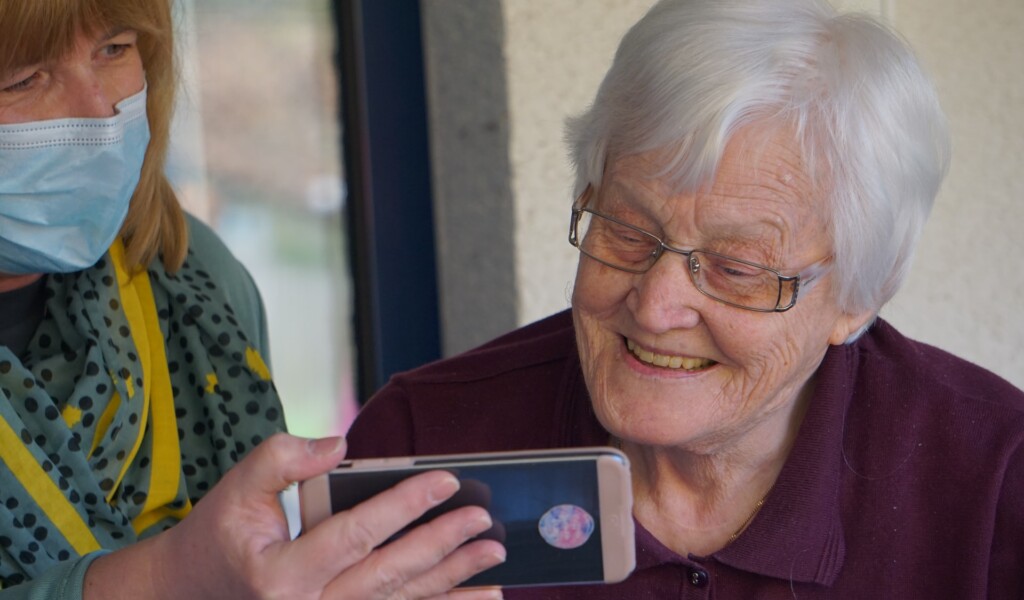
Finding the right level of care for your or a loved one is important as you age. There are a variety of options available, but which kind of home health aid is right for you?
Some people choose to get the help of a licensed practical nurse. Others choose to go down the home health aide route. Some may even prefer a mix of both! The key to choosing is to understand the different kinds of help these professionals provide and your needs.
Whether you’re looking for someone to supplement your family-given care or manage things completely, you’ve come to the right place. We’re going to break down the different kinds of home health aide options you have so you can figure out the best one for your unique needs.
Home Health Aides
Home health aides (HHAs) can be viewed as people that can assist with a variety of daily tasks. They focus on personal care and typically come to the patient’s home to assist them.
HHAs can help with hygienic tasks like grooming, bathing, dressing, and assistance with using the bathroom. They can also focus on other important household tasks like preparing meals, light housekeeping, running errands, and even transportation.
While it’s important to note that HHAs do receive training before they work, they do have limited medical training. The HHA you choose will be unable to provide medical assistance or nursing care, and should not be giving medical advice. However, they can monitor their client’s condition and do wellness-related work like reminding patients to take their medication or taking them to doctor’s appointments.
Certified Nursing Assistants
You can view certified nurse assistants (CNAs) as a tier above HHAs. They’re able to do many of the same tasks, but have a level of medical training and help that HHAs lack.
You can find CNAs in a variety of work settings outside of the home. They work in nursing homes, rehabilitation centers, hospitals, and other places that need skilled medical assistance.
The CNA you work with can handle many direct care tasks like grooming and hygiene, bathroom usage, and medication monitoring. What truly sets CNAs apart from HHAs is their training and supervision.
CNAs don’t just receive additional medical training, they also work under the supervision of a licensed medical professional. This can be a registered nurse (RN), licensed practical nurse (LPN), or a licensed vocational nurse (LVA).
That level of supervision allows CNAs to monitor the health of their patients in a way that HHAs are unable to. They’re able to track symptoms, take vitals, and can relay any health concerns their client may have to their supervising nurse.
Licensed Practical Nurse
Licensed practical nurses (LPNs) can provide basic medical care. Although they are capable of managing care-taking tasks like dressing and bathing, they’re much more focused on the medical side of caretaking. They’ll follow a treatment plan from an RN or doctor to ensure they’re giving their patients the best level of care
If you hire an LPN, they’ll be able to do important tasks like checking blood pressure, inserting catheters, and discussing care with patients. If more serious matters arise, they’ll report problems to doctors or registered nurses if more help/care is required.
You can find plenty of LPNs at hospitals, nursing homes, and other care facilities along with being able to use them at home. LPNs go through rigorous training and need to pass the National Council Licensure Examination (NCLEX-PN) in order to practice.
Learn more here.
Registered Nurse
A registered nurse (known as a RN) is the highest level of nursing care one can receive. RNs have passed the National Council Licensure Examination (NCLEX-RN) and are able to give a higher level of medical care than LPNs.
RNs are the nurses that can truly do it all. They’re able to coordinate plans for patient care, administer medications and treatments, and can even perform important diagnostic tests and analyze results.
Learn more here.
Which Professional Is Best For Me?
As you can see, there is a difference between home health aides, certified nursing assistants, licensed practical nurses, and registered nurses. Now that you know the differences between the titles, let’s dive into how you can find the right one for your needs.
Most of these decisions will heavily depend on the level of care you think will be needed. People that only need a little help taking care of themselves and around the house may want an HHA or CNA, others that require more rigorous medical care can benefit from LPN or RN assistance.
Take a moment to think about current medical needs. If you or your loved one have conditions that are easily managed with medication, an LPN or RN may not be what you need. Since they deal with more of the medical aspects of care, you could be better off with an HHA or CNA to help with daily tasks.
It’s also important to think about the level of help you already have from family and friends. If you’re currently lacking care of any kind it’s possible to have the help of two professionals. You may consider having daily help from an HHA and may check in with an LPN or RN once a week or so.
If you’re concerned about the financial aspect of care, be sure to talk to your insurance provider about coverage options.
Find Home Health Aides And More
Figuring out care options can be difficult even when you’re informed. If you need help finding the right level of care for yourself or a loved one, we’re here to help you get what you need.
Whether you need home health aides or more advanced medical care, we’re experts at helping people find the professionals they need to live their best life.
Do you have questions or want to learn more about our referral services? Reach out to us today so we can get you or your loved one the home help they need.
Do I need Postoperative Care?
July 1, 2021
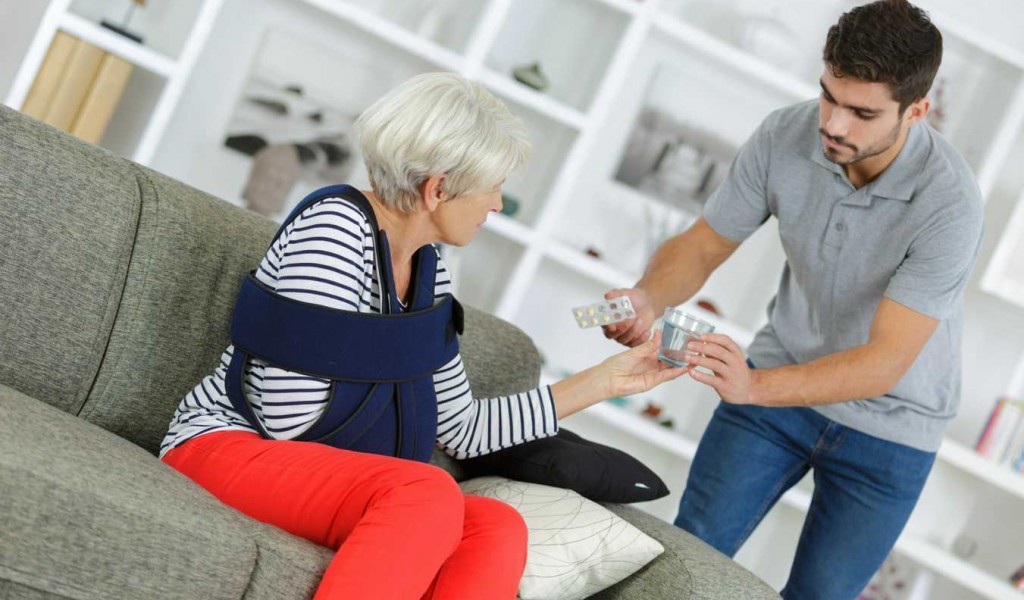
Every year, surgeons perform about 48 million surgical procedures in the United States alone. After every single one of these surgeries, patients have to go through a recovery period. During this time, their family members or medical staff take care of them until their bodies can continue with normal processes.
The kind of care that they get after surgery is called postoperative care. And, it’s extremely important to make sure that they’re getting the best care possible so that they can get better.
Pre and Postoperative Care
Similar to postoperative care, preoperative care provides help to individuals before they undergo surgery. This is helpful for people who may be suffering from a chronic condition.
Preparing ahead of your surgery is one of the best ways to ensure that the surgery itself goes well. This includes getting preoperative care if needed, asking the right questions, and getting an idea of what to expect after surgery.
Most hospitals and surgical centers will provide written discharge instructions, but you should ask a few questions upfront. Here are some questions you may want to consider asking:
- How long do I have to stay at the hospital/surgical center after the surgery?
- If I’m going home after the surgery, do I need designated medical care?
- Do I need to get any special medication or supplies for my post-surgical care?
- Should I look at hiring a physical therapist or nurse?
- What kind of side effects should I expect following the surgery?
- What problems should I look out for? What kind of complications should I call you about or visit the ER for?
- What can I do to support my recovery? What things should I avoid doing?
- When can I resume doing everything I did before the surgery?
By asking these questions, you’ll get a good idea of the kind of help you’ll need after the surgery. So, you can set up any care that you need ahead of time.
And, you’ll also know when you can return to normal, whether that be going to the gym, golfing, or something else.
Postoperative Care in the Hospital
If you’re staying in the hospital or surgical center after your surgery, your physician will move you to the recovery room following the surgery. You’ll likely be there for a few hours while you’re recovering from the anesthesia.
Medical staff will be there to monitor your blood pressure, heart rate, oxygen level, and other important vital signs. They’ll also inspect the surgical site for bleeding or infection. And, they’ll ensure that you aren’t having an allergic reaction to any of the medications that you’ve gotten.
Once the medical staff declares you stable, they’ll move you to a hospital room. Depending on your status, you may stay there for a few hours, days, or even weeks:
Outpatient Surgery
You may hear medical personnel refer to outpatient surgery as same-day surgery. After this kind of surgery, the medical staff will discharge you. That is unless you’re showing signs of any infection or other post-operative issues.
You won’t even need to stay overnight.
Postoperative care for this kind of surgery will include a quick but thorough check from the medical staff before they discharge you. They’ll ensure the following:
- You can breathe normally
- You can drink
- You can urinate
- You can sustain a good oxygen level
- You have a ride home
Most outpatient surgeries don’t require patients to hire at-home help. Although, if your family isn’t able to care for you while the anesthesia is wearing off, you may need to hire a nurse for the day.
Inpatient Surgery
Inpatient surgery involves staying overnight or for a few nights after the surgery. Postoperative care for this kind of procedure occurs in the hospital/surgical center.
Medical personnel will move these patients from the recovery room into a hospital room. They’ll place an IV catheter and start measuring vitals.
The medical staff will also likely have you perform a myriad of tasks and exercises to ensure that you’re able to do things for yourself after the surgery. One of the most important exercises is movement. The more that you move, the less likely it is that you’ll form a blood clot.
Postoperative Care at Home
Whether you had an outpatient or inpatient surgery, you’re likely going to need some kind of care when you leave the hospital. You need someone who’s going to hold you accountable for meeting all of the doctor’s commands and suggestions.
So, you should get someone who can take care of you. And, the best way to ensure that you’re doing things right is to make a postoperative nursing care plan. A postoperative nurse can help you make a plan that works for you and your doctor.
They will ensure that you’re following the doctor’s orders without overdoing it. And, they can lend a helping hand whenever things seem difficult.
Benefits of Postoperative Nursing Care
Postoperative nursing care is there when family can’t be. And, even if you do have family around, your nurse can help facilitate the recovery process.
If you don’t want your family members caring for you, let a postoperative nurse take care of it. They are knowledgeable in everything that you need to be able to do. And, they know how to take care of you just like the medical personnel at the hospital.
So, you can spend time hanging out with your family rather than worrying about them having to take care of you.
Do I Need Postoperative Nurse Care?
If you’re about to have surgery, you’ll likely need some level of postoperative care. It may be for a day or a month.
Be sure to talk to your doctor about the recovery period for your surgery so that you know what to expect. It’s also useful to know what kind of activities you may have trouble doing on your own. Then, you can find the perfect postoperative nurse for you.
And, while you’re looking for the right one, keep our care providers in mind. Contact us when you’re ready to get started.
Benefits of Companionship for Seniors
May 10, 2021

Now that 75 percent of the U.S. senior population have been vaccinated against COVID-19, let’s talk about the damaging effects the pandemic has had on the mental health and wellbeing of our senior loved ones.
It shouldn’t surprise us that isolation and loneliness can have significant negative effects on the health of seniors. Lonely seniors suffer a 59 percent higher risk of mental and physical health decline and a 45 percent greater risk of dying early, one study showed.
The positive impact of companionship and staying social on seniors is significant. Research suggests that staying active and forming close relationships with caregivers can have meaningful health benefits for seniors, including lower rates of chronic illness and increased longevity.
Just Like Family Home Care offers companion care to provide your senior loved one companionship, personal safety, and physical and mental wellbeing.
Read on to learn more about how companion care can offer you and your loved one a better quality of life.
What Is Companion Care?
Companion care provides seniors with a variety of services from emotional support, companionship, to making life’s daily tasks more manageable.
A home companion can help with things like grocery shopping, picking up prescriptions from the pharmacy, taking packages to the post office, driving, and light housework. Tasks like laundry, stocking the refrigerator with nutritious foods, and making sure seniors take their medications on schedule are all things a companion can do.
Most importantly, though, they offer a meaningful and trusting friendship for your loved one.
Nothing has greater benefits for seniors than being part of a community. Deep, meaningful relationships with other people are key to good health. When you look at your own life, what brings you the most joy and sense of wellbeing? For most of us, it’s having a sense of belonging and a good friend to talk to about our experiences.
Aging in Place vs. Residential Care
Seniors often move to nursing homes and residential care facilities because they think they will be safer and healthier. Unfortunately, this often isn’t the case. Studies show residents of nursing homes and senior living centers suffer worse health outcomes than seniors who are able to age in place.
In fact, depression in residential care facilities can be as high as 44 percent.
One study found that 90 percent of seniors over the age of 65 would prefer to age in place at home rather than move to a residential care facility. Aging in place means seniors can maintain their independence in an environment that is familiar and comfortable for them.
In addition to providing better social opportunities, aging in place is more affordable than nursing homes.
Keep reading to learn more about the many benefits of home companion care.
What Are the Benefits of Home Care?
Generally, seniors are shown to live a longer, healthier life when allowed to age at home with a companion. Next, we’ll dig into the variety of ways home care benefits seniors.
Better Overall Health and Longevity
Statistics show that seniors require 25% fewer doctor visits when they have home care.
Seniors enjoy spending time with a quality caregiver they know and trust. They have better nutrition, lower stress levels, a sense of belonging, and better social engagement.
Loneliness affects physical health in many ways. Seniors who experience isolation are often more likely to contract serious illnesses. Some of these include lung disease, arthritis, and loss of mobility.
Lonely seniors are more likely to engage in unhealthy behaviors. Some of these behaviors may include alcohol consumption, excessive eating, under-eating, and smoking.
Loneliness makes seniors spend more time indoors. A companion is a great way to encourage seniors to get outside and do light exercise on a regular basis. Lack of exercise can lead to increased blood pressure, heart disease, and other cardiac issues.
Companion care also prevents dementia. Seniors who suffer from loneliness have a 64 percent higher risk of dementia and memory loss.
Home Care Is Actually More Affordable
Did you know $25 billion a year in hospital costs is saved thanks to home care? In an assisted living center, a bed in a shared room will typically cost between $10,000 to $20,000 a year. A private room can cost more than $75,000.
We have good news. Many insurance providers now cover the cost of home care services as part of Medicare plans. Seniors can take advantage of Medicare coverage to help pay for in-home help on a part-time basis.
Medicare now covers part-time, in-home nursing care and home health aide care. This applies only when a doctor orders it.
Read more about the potential savings of aging in place.
The Positive Impact of Companionship and Staying Social on Seniors
Engaging in social activities can help keep us sharp and mentally stimulated. Mental stimulation can help to prevent the onset of dementia or Alzheimer’s disease.
Socialization and companionship allow us to maintain better emotional health. Connecting with others helps keep us in a positive mood, which decreases the risk of depression.
A care companion can even help to expand seniors’ circle of friends by exposing them to new experiences and social situations. Meeting new people is a much less anxious experience when you have a trusted friend by your side.
Who Else Benefits From Home Care?
We can’t stress enough the positive impact of companionship and staying social on seniors. Now that we understand the benefits of home care on seniors, it’s important that we talk about the benefits home care can have on the people who love and care about them most.
The benefit of companion care on the mental and emotional health of family members can’t be understated. You deserve to rest easy, knowing your loved one is safe, healthy, happy, and thriving. At Just Like Family Home Care, this is exactly the kind of service we can help you find.
Contact us today to learn more about how we can connect you to the best possible companion care services in your area.
Why In-Home Caregivers Are Vital for Keeping Seniors Safe During COVID-19
March 25, 2021

Older adults with COVID-19 are at a higher risk of developing serious symptoms.
This has been a hard time for seniors and their family members. COVID has left many seniors isolated in their homes, unable to see family and friends.
Home care providers offer essential services during the pandemic. Traditionally, caregivers assist with vital tasks such as dressing, bathing, medication reminders, grocery shopping, and preparing meals. Now, caregivers have another important job — protecting seniors from COVID-19.
Here’s more information about how caregivers can help during the pandemic.
How Your Caregiver Can Help
As the nation’s most vulnerable group, caregivers can offer senior health guidance as well as emotional support during this scary time. Here are the services you can expect when hiring in-home caregivers during COVID-19.
Communicate With Loved Ones
There are some seniors who haven’t seen their family and friends in a year due to the pandemic. If seniors don’t have a full grasp of technology, they may not be able to effectively communicate with their loved ones.
Caregivers can find creative ways for seniors to communicate with family and friends. From video chats sharing pictures, caregivers can help a senior set up their mobile device for multiple communication tactics.
Some seniors prefer the old-school way of communicating, such as sending letters and cards. If a senior is unable to write, their caregiver can write their message and send the letters and cards.
Proper Hygiene and Cleaning
Keeping seniors safe is essential during the COVID-19 pandemic, and the first place to start is by cleaning and sanitizing the home regularly. But not all seniors can commit to a regular cleaning schedule. Fortunately, caregivers can properly clean a senior’s home and disinfectant any high-touch surfaces.
Some high-touch surfaces they will clean include:
Light switches
Doorknobs
Cabinets
Counters
Remote controls
Phones
Handles
Faucet
Toilet
In addition, a caregiver can make sure seniors are properly bathed, can do their laundry, and make sure they wash their hands regularly.
Maintain a Routine
While in isolation, following a routine can be difficult. This is especially true for seniors, specifically those with Alzheimer’s. Caregivers know the importance of following a routine, so they will help seniors with their daily tasks.
Seniors also appreciate a caregiver’s routine visit. They feel safe with their caregiver and knowing their caregiver will visit at specific times will provide comfort.
Provides Comfort to Families
Keeping seniors safe during COVID-19 is a priority for loved ones. Unfortunately, this means families can’t or shouldn’t visit their senior loved ones, which causes a lot of worrying. This is especially true in regard to medical emergencies, when their loved ones may not be there to help.
Knowing a caregiver is there daily can help loved ones feel at peace. In case there is a medical emergency, their loved ones have someone there to respond to the situation.
The caregiver will also be a family’s point of contact to ensure everything is going smoothly with their family member. Caregivers can check for signs of COVID-19 and other medical conditions. In addition, caregivers will make sure seniors are mentally healthy, not showing symptoms of anxiety or depression.
Running Errands
Caregivers can also do a lot for seniors even if they’re not at their house. While there are many grocery delivery services, seniors can save money by having their caregivers deliver their groceries. They can also keep them stocked up on their medications, disinfectants, cleaning supplies, and more.
What to Ask a Caregiver Before Hiring Them
A caregiver can provide many benefits to seniors during the time of COVID-19. But you’ll need to choose the best caregiver. Here are some essential questions to ask to know you’re choosing the right caregiver.
What Care Do You Think Is Necessary?
While caregiving is usually necessary, some caregiving in-person visits are discouraged unless the senior needs these services in their day-to-day lives. Caregivers still need to limit their time in person and only provide necessary services.
Because of this, it’s essential you ask what services a caregiver will provide during this time. These usually include delivering medication, groceries, and assisting your loved one with tasks they can’t do on their own.
What Precautions Are You Taking?
While your caregiver prioritizes your and your loved one’s safety, they should also practice their own precautions.
Your caregiver should wear the necessary personal protective equipment (PPE) and undergo regular COVID screenings. The caregiver should always wear a mask, at the least, and many also wear a face shield for extra protection.
All caregivers go through different precautions. Be sure to discuss how they prepare to protect you and your loved one as well as themselves.
What’s My or My Loved One’s Care Plan?
All caregivers will create a care plan for you or your loved one, and it’s recommended you know what plan to expect. This usually includes days and times for grocery shopping, a regular cleaning routine, and when and how you’ll stay connected to loved ones.
Your caregiver should create this plan based on current CDC guidelines. They will also include emergency contacts in this plan.
When Is Telehealth a Better Option?
If you or your loved one are able to stay independent, telehealth caregiving may be a better option.
Some popular telehealth methods include video calls, phone calls, health apps, email, and more. Caregivers will check in regularly to make sure you or your loved one are handling your necessities, are taking any necessary medications, and aren’t showing symptoms of COVID-19.
Home Assistance Protecting Seniors in Florida From COVID-19
Caregivers are necessary if you or your loved one aren’t or are only partially independent. They can monitor seniors’ health, help them perform vital daily tasks, and run errands for them.
But now, home assistance protecting seniors in Florida from COVID-19 is more vital than ever. That’s why it’s essential to hire the best caregivers.
Do you need help finding the perfect caregiver? We can connect you to a variety of caregivers. Whether you need home health aids or live in-person care, you can visit our services page to see how we can help you.
